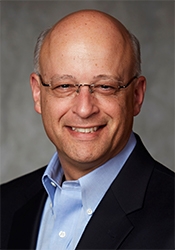The Rainmakers | DC Velocity | July 10, 2018
Print this Article | Send to Colleague
This excerpt features CSCMP Board Member, Mark Baxa. To view the entire article and read about all of the 2018 Rainmakers, visit www.dcvelocity.com.
|
MARK S. BAXA Supply chain management was not part of Mark Baxa's original career plan. When he graduated from the University of Illinois with a degree in agronomy and crop science, Baxa expected to work on the commercial side of the agribusiness world. And he did. But then, five years into the job, he became an international product manager at Asgrow, the UpJohn Co.'s seed business, where he was first exposed to supply chain management. That's when he caught the supply chain bug, seeing it as the "engine of innovation and where businesses truly compete." That newfound passion led to a series of 24 increasingly more senior supply chain leadership roles at what became part of the agrochemical giant Monsanto Co. (Asgrow was acquired by Empresas La Moderna from UpJohn and then by Monsanto in 2005.) In April of this year, he retired as the Global Procurement Center of Excellence lead for Monsanto to form an international supply chain consulting group called FerniaCreek LLC. |
 |
|
Throughout his career, Baxa has given back to the profession. He just completed a four-year term with the board of directors for WEConnect International, a nonprofit focused on developing women-owned businesses, and he is the incoming chairman of the board for the Council of Supply Chain Management Professionals (CSCMP). Q: Why do you feel participating in industry groups is important, and what have you gotten out of the experience? A: Where do I begin? Industry associations like CSCMP provide support to supply chain professionals to do the things we need to do but faster. For example, I recall receiving a very big deliverable – I was charged with developing and delivering a new distribution model – and I needed access to expertise. Within the first month of joining CSCMP, I was introduced to a supply chain leader who did this for their company. I will never forget the access CSCMP provided to the network of professionals that did indeed help me solve a number of critical supply chain challenges throughout my career! Q: What is one supply chain project or initiative you've worked on that you found to be particularly memorable? A: The biggest and the most challenging yet rewarding experience I had was leading the development of a truly global logistics function [at Monsanto]: global trade & compliance. This included the build-out of the organizational structure, roles, competencies, business processes, policies, logistics, suppliers, training, networks, and digitization to serve our customers while preserving our freedom to operate. What made it particularly memorable? Beyond all of the really cool things we developed and accomplished, it was the people. Bringing talent to the function and creating a global culture of cross-regional collaboration to ensure products were delivered and the work was performed correctly gave me the biggest satisfaction. It was about them. Helping others achieve their goals. It was also a challenging time. I learned that the complexity and evolution of optimizing standardized processes with IT systems takes courage and a will to persevere. It was truly amazing to see how people from around the world came together to create a new business model. It wasn't easy, nor was it perfect, but we made it happen together. Q: What advice do you have for someone who is looking to move into more of a leadership role? A: Look for opportunities to bring value to the organizations you work for by developing and leading people. Start out with the work you are responsible for, and while being inclusive, graduate to cross-functional, project leadership opportunities. Seek out other leaders to mentor you, ones who will take an active interest in helping you grow and develop. Attach yourself to organizations like CSCMP that add value to you and where you can help others by leading within them as well. My advice to follow as a leader? People really want to be associated with those who demonstrate genuine care and concern for others above themselves. Q: What advice do you have for companies that are looking to develop top supply chain talent? A: I believe fully in the 70/20/10 development model: 70 percent is learning in the role, 20 percent through mentorship and coaching, and 10 percent through capability-building coursework and training. Companies that want to win won't limit themselves and their people by ignoring the 20 percent or the 10 percent. Fund your training programs and mean it. Your people want to know you support their development, and if you show them you do, your retention and business results will reflect it. |
|

